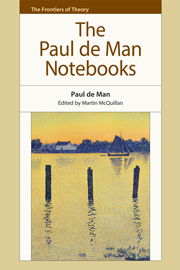Book contents
- Frontmatter
- Contents
- Series Editor's Preface
- Acknowledgements
- Dedication
- Introduction: ‘The Unimaginable Touch of Time’: The Public and Private in the Notebooks of Paul de Man
- PART I Texts
- PART II Translations
- PART III Teaching
- 17 Field of Comparative Literature: Analysis of Needs (1967)
- 18 The Comparative Literature Program at Rutgers University: A Report
- 19 Comparative Literature 816a: Hegel and English Romanticism
- 20 Comparative Literature 816a: Hegel and English Romanticism
- 21 Comparative Literature 817a: Aesthetic Theory from Kant to Hegel
- 22 Curriculum for Lit Z Proposal (1975)
- 23 Literature Z: Exercise II
- 24 Rhetorical Readings
- 25 Director's Report on Rhetorical Reading (1982)
- 26 Seminar on “Aesthetic Theory from Kant to Hegel”. Fall Semester, 1982
- PART IV Research
- Appendix. The Notebooks of Paul de Man 1963–83
- Bibliography
- Index of Names
24 - Rhetorical Readings
from PART III - Teaching
Published online by Cambridge University Press: 05 December 2014
- Frontmatter
- Contents
- Series Editor's Preface
- Acknowledgements
- Dedication
- Introduction: ‘The Unimaginable Touch of Time’: The Public and Private in the Notebooks of Paul de Man
- PART I Texts
- PART II Translations
- PART III Teaching
- 17 Field of Comparative Literature: Analysis of Needs (1967)
- 18 The Comparative Literature Program at Rutgers University: A Report
- 19 Comparative Literature 816a: Hegel and English Romanticism
- 20 Comparative Literature 816a: Hegel and English Romanticism
- 21 Comparative Literature 817a: Aesthetic Theory from Kant to Hegel
- 22 Curriculum for Lit Z Proposal (1975)
- 23 Literature Z: Exercise II
- 24 Rhetorical Readings
- 25 Director's Report on Rhetorical Reading (1982)
- 26 Seminar on “Aesthetic Theory from Kant to Hegel”. Fall Semester, 1982
- PART IV Research
- Appendix. The Notebooks of Paul de Man 1963–83
- Bibliography
- Index of Names
Summary
The Seminar deals with a central problem in contemporary literary theory from a pedagogical, rather than from a purely theoretical perspective. It investigates how an awareness of the rhetorical properties of language influences the modalities and expectations of our reading and, consequently, of the way in which the reading of literary works is taught to undergraduates. This pragmatic approach is based on the experience of an experimental course for Yale undergraduates taught for the last four years. The assigned readings consist, for the most part, of literary and philosophical primary texts rather than of contemporary works of literary theory. The tentative list includes (in the order of their appearance) texts by Keats, Baudelaire, Yeats, Pascal, Kleist, Henry James, Hegel, possibly Melville or Goethe or Proust, Derrida, and Ricoeur. Except for one larger novel, none of the assigned texts is more than twenty-five pages long and, in several cases, they consist of only one short poem or available in photocopies. No specialized knowledge of philosophy or of any of the authors selected for discussion is assumed. All foreign texts are made available in English translation and although constant reference will be made to the originals, no knowledge of French and German is required to take part in the seminar; on the other hand, it is of course expected that some of the participants will know French, or German, or both.
- Type
- Chapter
- Information
- The Paul de Man Notebooks , pp. 253 - 254Publisher: Edinburgh University PressPrint publication year: 2014



